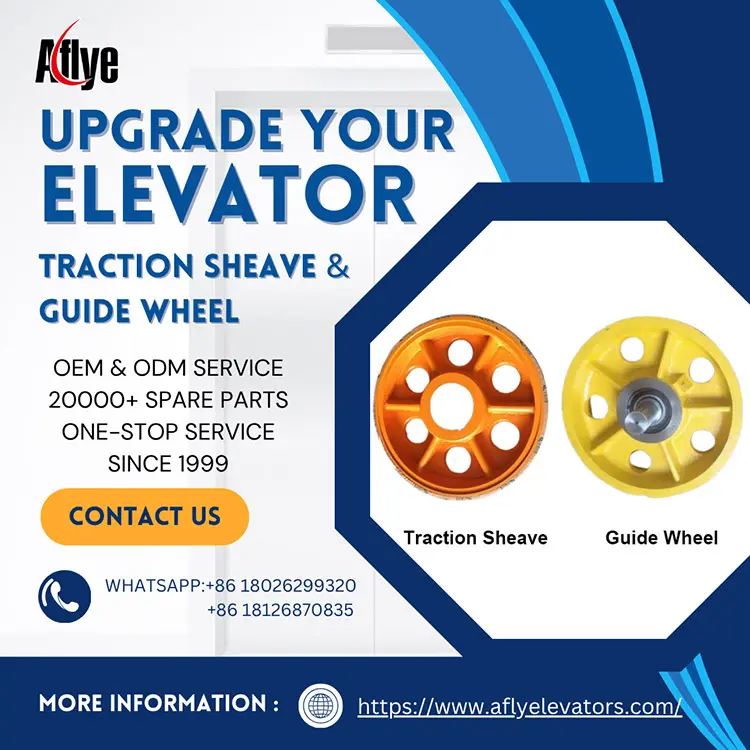What Is the Difference Between a Traction Sheave and a Guide Wheel?
In an elevator system, both the traction sheave and the guide wheel are critical running components.Although both are “wheel-type” parts, they serve completely different purposes and have a major impact on elevator stability, safety, and ride comfort.
Many clients often ask during procurement or modernization projects:
What is the difference between a traction sheave and a guide wheel? Can they be used interchangeably?
Today, the technical team from A-FLY Elevator & Escalator Parts Supplier explains their differences in detail.

1. What Is a Traction Sheave?
The traction sheave is one of the core components of the elevator drive system.
Installed on the traction machine, it uses friction between the sheave and the wire rope to move the car and counterweight.
Main Functions of a Traction Sheave:
Power transmission — its primary role
It converts the motor’s torque into traction force to move the elevator.
Provides friction for rope movement
The groove shape, depth, and surface material directly determine traction performance.
Maintains balance between car and counterweight
The more stable the traction, the smoother the elevator runs.
Determines speed, load capacity, and ride quality
Different sheaves are designed for low-, medium-, or high-speed elevators.
In simple terms:
The traction sheave determines whether the elevator can move — and whether it moves smoothly.
2. What Is a Guide Wheel?
The guide wheel ensures that the elevator runs smoothly and steadily along the guide rail.
It is typically installed on the car frame, counterweight frame, or door system.
Main Functions of a Guide Wheel:
Keeps the elevator running straight and stable
Prevents sway, shake, or lateral movement.
Reduces friction and noise
Roller-style movement significantly lowers metal-to-metal noise.
Protects the guide rails
Minimizes wear and extends the life of the elevator’s mechanical structure.
Improves ride comfort
The smoother the movement, the better the passenger experience.
In simple terms:
The guide wheel ensures the elevator runs smoothly, quietly, and comfortably.
3. Key Differences Between a Traction Sheave and a Guide Wheel
1. They Have Completely Different Functions
Traction Sheave → Power & Motion
Guide Wheel → Stability & Directional Guidance
2. Installed in Different Locations
Traction Sheave: On the traction machine (machine room or hoistway top)
Guide Wheel: On the car frame, counterweight, or door components
3. Different Structure & Materials
Traction Sheave:
Metal
Rope grooves
Designed for high traction and load-bearing
Guide Wheel:
Nylon / PU / rubber / plastic
Built with precision bearings
Designed for low friction, low noise
4. Different Replacement Cycles
Traction sheave: Long service life; replaced when grooves are worn
Guide wheel: Wears faster; requires regular inspection and replacement
4. Can a Traction Sheave Replace a Guide Wheel?
Absolutely NOT.
They are completely different in design and function.
If the elevator loses proper guidance, it may cause:
Vibrations
Shaking
Noise
Safety hazards
In severe cases, improper guiding could cause the car to deviate from its track — a major safety risk.
5. A-FLY — Your One-Stop Supplier for Traction Sheaves & Guide Wheels
As a leading elevator & escalator parts supplier, A-FLY provides a full range of traction and guiding system components:
Traction System Components
Traction sheave bearings
Guiding System Components
Car guide wheels
Counterweight guide wheels
Door guide wheels
Guide rails & guide shoe parts
A-FLY products are compatible with all major elevator brands and support customized sizes, materials, and global delivery.
6. Conclusion: For a Safe and Stable Elevator, Both Wheels Must Do Their Job
The elevator traction sheave makes the elevator move.The elevator guide wheel makes the elevator move smoothly.Both are essential, and neither can replace the other.Regular maintenance and timely replacement ensure long-term safety and stability.
Choose A-FLY — stronger traction, smoother guidance, safer operation.

